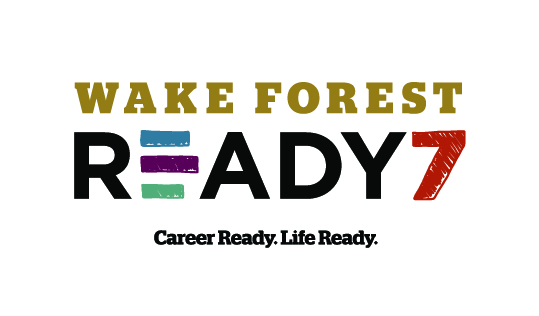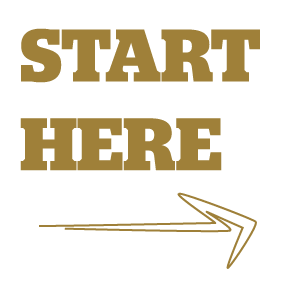Ready7

What it means to be Ready7
It isn’t just about the job you land once the diploma is in your hand, it’s more than that. To be Ready7 means you’re prepared and focused for whatever life may throw your way. From your aspirations, to the people who believe in you, even to how you believe in yourself… These seven tools give direction and purpose to the unclear and often-daunting journey from college to career.


1. Self-Awareness
Being able to articulate your skills, interests, and values for your own clarity and decision-making – and to communicate with others.
Often overlooked, understanding yourself – your strengths, skills, interests, and values – is foundational. It enables you to connect your Wake Forest experience to the world of work and confidently articulate who you are and what interests you. It is the “personal” in Personal and Career Development.
Make two lists: your three strongest skills; and three topics that energize or interest you.
- Take a College-to-Career course.
- Meet a career coach, visit drop-in office hours in the OPCD, or take a self-assessment.
- The OPCD offers the Myers Briggs Type Indicator and the Strong Interests Inventory. These online assessments provide insight into your personality and career interests. Meet with a career coach for more information.
2. Career-Awareness
Knowing potential career paths of interest that align with your skills, interests, and values.
There are a large range of careers available and most students are not even aware of them. Having a clear understanding of career options is essential.
Create a list of three career areas to explore. For ideas and more information, check out the Explore Careers.
- Browse Wake Forest alumni profiles by career, major or city on LinkedIn.
- Have a conversation with alumni or contacts in your area of interest to help determine which options to more deeply investigate.
3. Personal Branding
Having strong, updated personal-branding materials: resume, LinkedIn and Handshake profiles, and a professional introduction.
A personal brand is the impression you give -in person, online, or on paper. A positive impression is often the difference-maker in getting hired and building a professional network.
Create (or update) your resume, LinkedIn and Handshake profiles and use best-practice tips and examples found here.
- Refine your Linkedin profile and add professional experiences that highlight your measurable impact on the organization.
- Use the “elevator pitch” worksheet or work with a career coach to develop a 30 to 60-second snapshot of your interests and why you add professional value.
4. Network & Relationship Building
Building and sustaining successful relationships to share knowledge and information – one person at a time.
Many students do not like the term “networking,” but, young professionals seeking opportunities need to learn, connect and have conversations with adult professionals and employers who can offer information, perspective, and advice about careers, helpful resources and experiences, internships and jobs.
Build 5-10 connections on LinkedIn with alumni and professionals by sending well-written personal connection requests.
- Be prepared with a solid answer to the question, “What do you want to do after Wake Forest?”
- Share your career interests with a network of “adult fans” – family, friends, and professors. They may be able to connect you with contacts and/or opportunities.
- Use LinkedIn to identify and connect with interesting alumni in companies, job function, locations and other areas of interest.
5. Interviewing Skills
Being able to conduct a formal conversation with a potential employer or admissions officer who is seeking to determine if a student is the best fit for their opportunity.
Most students do not have experience interviewing under pressure. Opportunities are often decided based on interviews, so you must have practiced, confident, researched answers – and questions for the interviewer.
Create a list of five important experiences highlighting skills and experience desired by an organization using the STAR method; Practice talking about these experiences in front of a mirror or by recording and watching on your phone or computer.
- Identify skills for the role you seek (based on the job description) and refine stories based on your skills and experiences.
- Practice interviewing with a professional, an OPCD coach, or InterviewStream, an online mock interview practice tool found here.
6. Professional Skills
Having the skills, knowledge, and attitude to be effective and successful in the workplace and/or graduate school environment.
For internships, first jobs and graduate school, organizations want you to arrive with workplace skills and attitudes, including etiquette, professional written communication skills, and use of business software like Excel. Skills may be learned outside the classroom, including at work, in campus organizations, and through online resources and courses.
Develop new professional skills – or improve existing ones – using LinkedIn Learning courses. A link is available on the OPCD website.
- Be professional in all correspondence, especially email.
- Develop public speaking skills by presenting in class, in an internship, or in extracurricular activities – and asking for specific feedback.
- Complete advanced LinkedIn Learning courses focused on Excel, technology, project management, time management, and other necessary skills.
- Learn more about data, organizational communication, leadership, and professionalism skills using Sage Explorer through ZSR Library.
7. Life & Leadership
Preparing for a life after college with knowledge and skills to manage personal relationships and professional choices, and to be an authentic, ethical leader contributing to the community with a spirit of Pro Humanitate.
Leading an authentic and meaningful life is the core of Wake Forest’s commitment to educating the whole person. To do so, it is imperative for you to not only find a job and be successful in the workplace, but to honor and focus on the development of your own character, values and strengths.
Visit the Alumni Personal & Career Development website to access tools, resources, and guidance for your life after college; and read “Five For Your First Five: Own Your Career and Life After College” to learn the five areas for young adults to master in the first five years after Wake Forest.
- Intentionally reflect on college, first professional experiences and what you know now about your personal values, strengths, and interests.
- Build community with people who can provide feedback, mentorship and connect to helpful resources.
